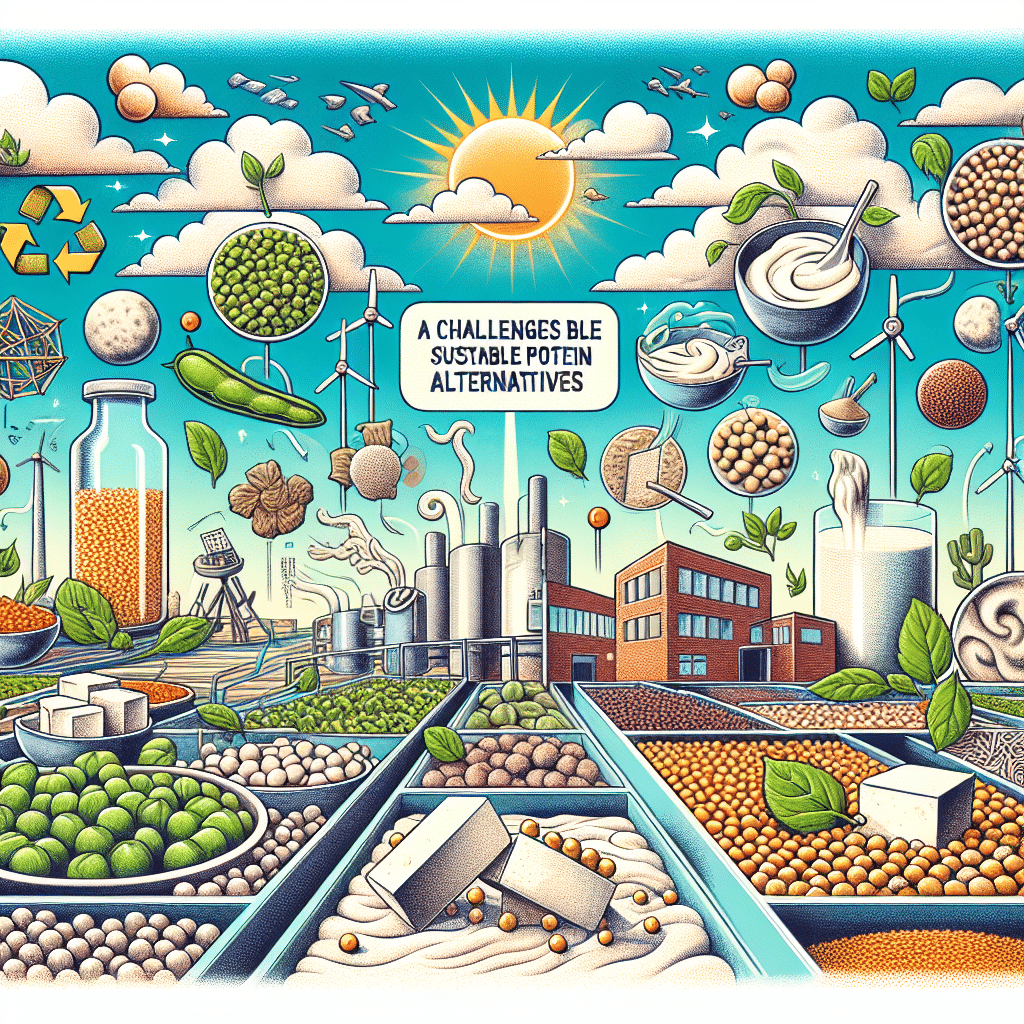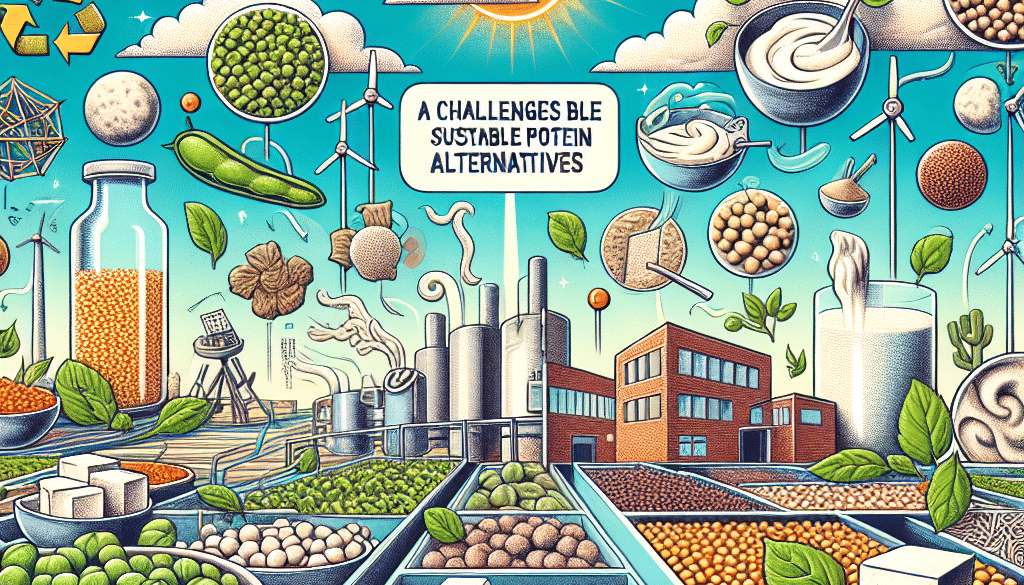Challenges and Innovations in Sustainable Protein Alternatives
Table of Contents
- Sustainable Protein Alternatives: Challenges and Innovations
- Challenges in Developing Sustainable Protein Alternatives
- Innovations in Sustainable Protein Sources
- Plant-Based Proteins
- Fermentation-Derived Proteins
- Cultured Proteins
- Statistics Supporting the Growth of Sustainable Proteins
- Conclusion: The Future of Protein is Sustainable
- ETprotein: Your Source for High-Quality Sustainable Proteins
Sustainable Protein Alternatives: Challenges and Innovations

The global demand for protein is on the rise, driven by a growing population and increased awareness of health and nutrition. However, traditional sources of protein, such as meat and dairy, come with significant environmental footprints. This has led to a surge in interest in sustainable protein alternatives. These alternatives aim to provide the necessary nutrients while minimizing environmental impact. In this article, we will explore the challenges and innovations in the field of sustainable protein alternatives.
Challenges in Developing Sustainable Protein Alternatives
While the potential benefits of sustainable protein sources are vast, there are several challenges that need to be addressed to make these alternatives widely available and accepted.
- Scalability: One of the primary challenges is scaling up production to meet global demand. Many alternative protein sources are still in the early stages of development and are not yet produced on a scale that can compete with traditional animal proteins.
- Consumer Acceptance: Taste, texture, and cultural preferences play a significant role in the adoption of alternative proteins. Overcoming consumer skepticism and adapting products to meet diverse tastes is crucial for market penetration.
- Nutritional Profile: Ensuring that alternative proteins match or exceed the nutritional benefits of conventional animal proteins is essential. This includes not only the protein content but also the amino acid profile and the presence of other nutrients.
- Regulatory Hurdles: New food products often face strict regulatory scrutiny before they can be brought to market. Navigating these regulations can be time-consuming and costly for companies developing sustainable protein alternatives.
- Economic Viability: Alternative proteins must be competitively priced to encourage widespread adoption. This requires efficient production methods and economies of scale.
Innovations in Sustainable Protein Sources
In response to these challenges, numerous innovations have emerged in the field of sustainable protein alternatives. These innovations span a variety of sources, including plant-based, fermentation-derived, and cultured proteins.
Plant-Based Proteins
Plant-based proteins are derived from sources such as soy, peas, and rice. They have been at the forefront of the sustainable protein movement, with products like veggie burgers and meatless sausages becoming increasingly common.
- Textured Vegetable Protein: Innovations in texturizing plant proteins have led to products that closely mimic the taste and texture of meat, making them more appealing to consumers.
- Protein Blends: Combining different plant proteins can create a more complete amino acid profile, improving the nutritional value of these products.
Fermentation-Derived Proteins
Fermentation is a process that uses microorganisms to produce protein. This method can yield high-quality proteins with a lower environmental impact than traditional animal agriculture.
- Mycoprotein: Produced from fungi, mycoprotein is a complete protein that has been used in products like Quorn for decades.
- Precision Fermentation: This process involves engineering microorganisms to produce specific proteins, including those identical to animal proteins, in a controlled environment.
Cultured Proteins
Cultured proteins, also known as lab-grown or cell-based proteins, are produced by cultivating animal cells in a lab. This method has the potential to produce meat without the need for raising and slaughtering animals.
- Cellular Agriculture: Innovations in cellular agriculture have led to the development of cultured meat that replicates the taste and texture of traditional meat.
- Bioreactors: Advances in bioreactor technology have improved the efficiency and reduced the cost of cultured protein production.
Statistics Supporting the Growth of Sustainable Proteins
According to a report by MarketsandMarkets, the global plant-based protein market is projected to grow from USD 10.3 billion in 2020 to USD 14.5 billion by 2025, at a CAGR of 7.1%. This growth is indicative of the increasing consumer interest in sustainable protein alternatives. Additionally, a study by the Good Food Institute revealed that investment in alternative proteins reached a record $3.1 billion in 2020, which is three times more than in 2019.
Conclusion: The Future of Protein is Sustainable
The challenges in developing sustainable protein alternatives are significant, but so are the opportunities. Innovations in plant-based proteins, fermentation-derived proteins, and cultured proteins are paving the way for a more sustainable and ethical food system. As technology advances and consumer demand grows, these alternatives are likely to become an increasingly important part of our diets.
For those interested in exploring sustainable protein options, ETprotein offers a range of high-quality organic bulk vegan proteins and L-(+)-Ergothioneine. Their products are non-GMO, allergen-free, and come with a neutral taste, making them an excellent choice for various industries.
ETprotein: Your Source for High-Quality Sustainable Proteins
About ETprotein:
ETprotein, a reputable protein and L-(+)-Ergothioneine (EGT) Chinese factory manufacturer and supplier, is renowned for producing, stocking, exporting, and delivering the highest quality organic bulk vegan proteins and L-(+)-Ergothioneine. They include Organic rice protein, clear rice protein, pea protein, clear pea protein, watermelon seed protein, pumpkin seed protein, sunflower seed protein, mung bean protein, peanut protein, and L-(+)-Ergothioneine EGT Pharmaceutical grade, L-(+)-Ergothioneine EGT food grade, L-(+)-Ergothioneine EGT cosmetic grade, L-(+)-Ergothioneine EGT reference grade and L-(+)-Ergothioneine EGT standard. Their offerings, characterized by a neutral taste, non-GMO, allergen-free attributes, with L-(+)-Ergothioneine purity over 98%, 99%, cater to a diverse range of industries. They serve nutraceutical, pharmaceutical, cosmeceutical, veterinary, as well as food and beverage finished product distributors, traders, and manufacturers across Europe, USA, Canada, Australia, Thailand, Japan, Korea, Brazil, and Chile, among others.
ETprotein specialization includes exporting and delivering tailor-made protein powder and finished nutritional supplements. Their extensive product range covers sectors like Food and Beverage, Sports Nutrition, Weight Management, Dietary Supplements, Health and Wellness Products, and Infant Formula, ensuring comprehensive solutions to meet all your protein needs.
As a trusted company by leading global food and beverage brands and Fortune 500 companies, ETprotein reinforces China’s reputation in the global arena. For more information or to sample their products, please contact them and email sales(at)ETprotein.com today.












